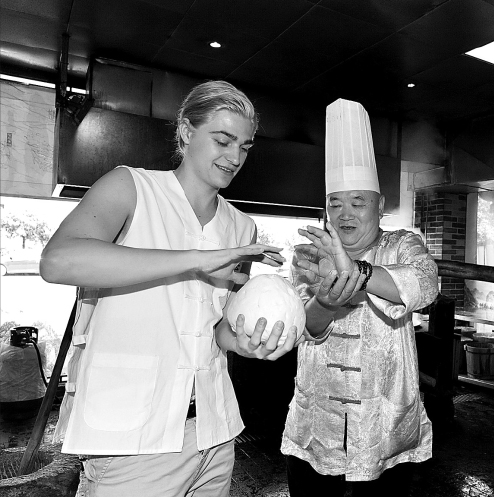Guilin's rice noodles ready for world spotlight


As one of China's most popular tourist destinations, Guilin in the Guangxi Zhuang autonomous region has long been famed for its natural beauty. Its signature landscape - the Lijiang River running through a valley full of karst hills - has been adopted as a picture on the back of the 20-yuan renminbi note.
Now, local authorities are striving to make the city just as famous for another of its natural resources - the Guilin rice noodle.
With a history dating back some 2,000 years, the traditional snack - which uses the water from Lijiang River and rice grown in Guilin as raw materials - has long enjoyed high popularity among local residents and tourists from China and abroad.
Now, the rice noodle has been granted a geographical indication trademark, which authorities hope will be a launching pad to boost the food's popularity worldwide.
"The specialty's fame can compete with that of the Guilin landscape, thus becoming another calling card of the city," Lei Sheng, vice-mayor of the city, said at a promotional event in Beijing on Monday.
CNN has ranked the Guangxi rice noodle as one of the favorite dishes that can cure the homesickness of the Chinese living overseas, according to Yang Yanhui, deputy head of the market operation and consumption promotion division at the Department of Commerce of Guangxi.
The nationwide exhibition tour is part of the efforts to market specialties in the region, Yang said.
Her team will work to help improve the brand quality and encourage local business to go global, she said.
The measures include construction of a themed industrial park and a rice noodle quality supervision center, as well as increasing online and international promotion, she added.
The Guilin city government has rolled out a series of standards, covering production, services and shop construction and ranking, to ensure the quality of the specialty and encourage technological innovation.
Qian Hengqing, a co-partner of Guilin SanYang Dietary Ecological Industry Co Ltd, told China Daily that Guilin's friendly ecosystem and government support for the rice noodle business prompted his decision to cast his eyes onto the sector.
An industrial leader in the rice noodle market, SanYang has developed a new technology in preserving the wet rice noodle. The patented biotechnology uses a particular form of bacteria instead of artificial preservatives to prevent the food from decaying.
The technological breakthrough allows for an extended preservation period of up to 12 months, facilitating the rice noodle's overseas journey, local officials said.
Qian said that his company is stepping up to apply for a patent in the United States.
"While conventionally, the Guilin specialty used stocked rice as materials, we have changed the way," he said. "We use the rice harvested in the current year to make the noodle healthier and our technological prowess enables our product to retain the authentic flavor."
The state-of-the-art technology has won the company huge orders. During the event, it signed a 5 million yuan (about $721,000) deal with Polarlite Foods Inc from Ontario, California, and an additional 3 million yuan transaction with China National Organic Green Food Industrial Corp, headquartered in Beijing.
Jacky Lyv, CEO of PolarLite Foods Inc, told the Chinese media that his company has tried some samples, which were received well in the US market.
Chinese communities in the US will be the first targeted group, he said, adding that he has faith in the eventual popularity of Guilin rice noodles with others across the country.
In addition, another 13 pairs of trade partners also signed deals on the spot.
Government data show that Guilin's rice noodle sector generated close to 7 billion yuan in combined output value in 2017, contributing 2.3 percent of the city's GDP.
The amount is projected to increase to 10 billion yuan in 2021, according to the vice-mayor.
"The city government will continue to advance its strategy of transforming small specialties into big industries and give equal priority to the development of culture, tourism and industries," Lei said.
"We will promote the Guilin rice noodle sector's move toward industrialization and standardization on a branded and green growth path."
scott@chinadaily.com.cn




































